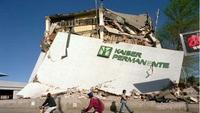-
Arizona voted against complying with Real ID, and state residents now face the consequences
In 2008, Arizona lawmakers passed a bill (HB 2677), signed by then-Governor Janet Napolitano, prohibiting the state from complying with the Real ID Act. Limits on people without a Real ID-compliant driver’s license, such as no access to federal facilities, will be phased in in three stages – 21 April 2014, 21 July 2014, and 19 January 2015. Those who do not have a Real ID will need a passport, a second form of identification, or an “enhanced” driver’s license.
-
-
Alabama did not share enough DHS funds with local governments
An audit by the DHS inspector general’s office found that Alabama’s Homeland Securityprogram has not met the conditions of receiving DHS grants, as it fails to share adequate grant money with local governments. The audit, completed in May, found that of the $20.5 million awarded to Alabama for homeland security projects between 2010 and 2012, the state agency gave less than the required 80 percent of funds to local governments.
-
-
Continued funding for S.C. mixed-oxide fuel (MOX) plant – at least until fall
Federal legislators have secured the funds to keep the mixed-oxide fuelplant (MOX) at the Savannah River Sitein South Carolina moving forward at least into fall, according to South Carolina governor Nikki Haley and members of the state’s congressional delegation. The 310-square mile site once produced components for nuclear weapons, but since the agreement with Russia to turn nuclear weapons into reactor fuel, the site has focused on repurposing and cleanup.
-
-
California builds a sophisticated Emergency Response Training Center
Citing the need for further emergency training, some Sacramento County officials have proposed a plan to construct a $56 million training facility for Californian emergency responders which would handle all types of training and scenarios.
-
-
Plans for nationwide 911 dispatch centers advance
Municipalities across the country are planning to connect 911 dispatch centers in an effort to improve information sharing. Plan is to connect dispatchers via the Internet, which will allow centers quickly to transfer calls, 911 text messages, photos, videos of accident scenes, and other information. The technology is part of a “Next Generation 911” initiative already being implemented across the country.
-
-
Effectiveness of Texas National Guard border troop surge questioned
Texas governor Rick Perry’s plan to send nearly 1,000 Texas National Guardtroops to the Rio Grande Valley has been applauded by the governor’s supporters, but critics question its effectiveness. Gov. Perry’s decision to send nearly 1,000 guardsmen to the Rio Grande Valley is described as “symbolic,” and top officials in border counties agree that sending more guardsmen to the border would bring little change to the current situation.
-
-
NYC forms a task force to coordinate accommodation for migrant children
New York City officials have formed a task force to help coordinate accommodation for Central American children who have arrived in the city in recent months after weeks and months of living under the care of immigration and border officials near the Southwest border. Since October 2013, federal officials have sent more than 3,200 children to New York City and elsewhere in the state to live with relatives or guardians, and about 7,000 more are expected to arrive in the coming months, according to officials who have been briefed by federal authorities.
-
-
Using drones in law enforcement work
Using unmanned flight systems for domestic surveillance can provide emergency responders information during fires, earthquakes, storms, and man-made disasters, said John Hill, director of the Indiana Department of Homeland Security.He said that the general public is open to the use of unmanned systems when informed about their use.
-
-
Silicon Valley braces for floods, storm surges caused by sea level rise
A new analysis found that $36.5 billion in property and at least 145,000 California residents could be directly affected in the next thirty years from flooding caused by sea level rise. San Mateo County, home to major corporations including Facebook, Oracle, and Genentechin Palo Alto, and the low-income population of East Palo Alto, would be the most affected.
-
-
Appeals Court blocks Arizona’s order denying driver’s licenses to “dreamers”
A three-judge panel of the Ninth U.S. Circuit Court of Appeals has blocked an August 2012 executive order issued by Arizona’s Republican governor Jan Brewer which denies driver’s licenses and other public benefits to young immigrants who are allowed to remain in the United States under a 2012 Obama administration policy.
-
-
Seattle builds resiliency in the face of changing climate
The federal government’s National Climate Assessment, released in May, detailed the region-by-region effects which includes water shortages, sea-level rise, and more frequent wildfires. Most American cities fall short on climate change preparation when compared to several major cities around the world. A survey conducted by MIT reported that globally, “the U.S. has the lowest percentage of cities engaged in (climate change) assessments and planning.” Seattle has decided it needs to act, and act now, to make itself more resilient in the face of a changing climate.
-
-
N.C. “rolling” 30-year sea level rise report gaining support from both sides
In 2010, coastal developers and Republican legislators in North Carolina were alarmed when a state science panel warned that the Atlantic Ocean is expected to increase by thirty-nine inches along the state’s shores by the end of the century. The state legislature soon ordered a four-year moratorium on official sea-level predictions and gave the Coastal Resources Commission(CRC) guidelines for developing a new official state forecast. In May, Frank Gorham III, chairman of the commission, announced that the next forecast will only predict sea-level rise for the next thirty years, a time span during which model-based predictions about sea level rise along the North Carolina coast – about eight inches — are largely accepted by both sides to the climate change debate. Gorham stresses, however, that he wants a “rolling” 30-year forecast to be updated every five years.
-
-
Experts debate the vulnerability of Midwest cities to terrorist attacks

The crises in Syria and Iraq have increased worries about terror cells taking aim at American targets, specifically New York, Boston, and Los Angeles. As larger cities step up their counterterrorism efforts, however, analysts debate whether less populated cities in the Midwest are safe or just as vulnerable to terror attacks.
-
-
L.A. to catalog buildings at risk of collapse during a major earthquake

After years of efforts to get officials to catalog buildings at risk of collapse during a major earthquake, Los Angeles City Council late last month instructed building officials to establish a database of such buildings. About 29,226 buildings built before 1978 are subject to survey, but city officials would use mapping programs to narrow down which structures need further field inspection. The city estimates roughly 5,800 buildings are at risk, and an additional 11,690 buildings will need inspection on site to determine whether they are soft-story buildings or not. Los Angeles has yet to decide what to do once it compiles the list, and whether to require retrofitting of vulnerable buildings, but seismic experts and policymakers insist that finding out which buildings are vulnerable is a necessary first step.
-
-
Pentagon’s excess equipment makes local police resemble military units
In the early 1990s, Congress authorized the Pentagon to transfer excess military equipment to law enforcement agencies across the country for use in counter-drug activities. Since the program’s inception, the Pentagon has transferred $4.3 billion worth of military equipment to local and state agencies. In 2013 alone, $449,309,003 worth of military property was transferred to law enforcement. Critics say that more and more police departments now resemble military units, and that military gear is used in cases where it should not – as was the case in a small Florida town in 2010, when officers in SWAT gear drew out their guns on raids on barbershops that mostly led to charges of “barbering without a license.”
-
- All
- Regional
- Water
- Biometrics
- Borders/Immig
- Business
- Cybersecurity
- Detection
- Disasters
- Government
- Infrastructure
- International
- Public health
- Public Safety
- Communication interoperabillity
- Emergency services
- Emergency medical services
- Fire
- First response
- IEDs
- Law Enforcement
- Law Enforcement Technology
- Military technology
- Nonlethal weapons
- Nuclear weapons
- Personal protection equipment
- Police
- Notification /alert systems
- Situational awareness
- Weapons systems
- Sci-Tech
- Sector Reports
- Surveillance
- Transportation
Advertising & Marketing: advertise@newswirepubs.com
Editorial: editor@newswirepubs.com
General: info@newswirepubs.com
2010-2011 © News Wire Publications, LLC News Wire Publications, LLC
220 Old Country Road | Suite 200 | Mineola | New York | 11501
Permissions and Policies
Editorial: editor@newswirepubs.com
General: info@newswirepubs.com
2010-2011 © News Wire Publications, LLC News Wire Publications, LLC
220 Old Country Road | Suite 200 | Mineola | New York | 11501
Permissions and Policies
